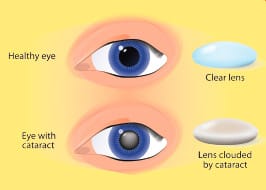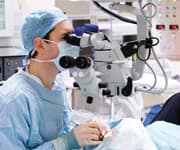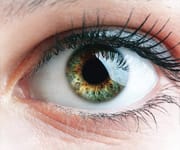Life Extension Magazine®
Each year, 3 million Americans have cataract surgery. More than 98% of these procedures are successful. Considering the number of aging people who used to face inevitable blindness from cataracts, the advent of modern cataract surgery represents a true miracle of medicine.
The official published number is that only 0.5% of cataract surgery patients encounter severe postoperative complications such as blindness. However, there is considerable underreporting, so the true number could be somewhat higher.
While the published number is low, it still represents 15,000 Americans every year who lose their eyesight because of a failed cataract surgery.
What these statistics do not show is the fact that even in successful cases, some surgeons consistently get better vision results for their patients.
To avoid being among the 15,000 who have serious complications, including unnecessary blindness from cataract surgery, it is important to learn how to select your eye surgeon. While most surgeons are good, some are definitely better than others.
Understanding Cataracts
Age-related cataracts are a progressive clouding of the lens tissue, which is inside the eye behind the iris or colored part of the eye. This change in the lens tissue can affect one or both eyes. In the case of age-related cataracts, one eye will generally deteriorate faster than the other, but both will eventually need treatment.
Cataracts occur when proteins in the lens of the eye become glycated to the point that clarity is diminished. The result is a gradual degradation of visual quality that if not surgically corrected leads to virtual blindness.
Glycation is the pathologic binding of a sugar molecule to the body’s proteins or lipid molecules resulting in the formation of nonfunctioning tissue structures. The lens of the eye is especially vulnerable to this type of degeneration. Some of the nutrients that help to inhibit glycation include carnosine, benfotiamine, glutathione, and activated forms of vitamin B6 (pyridoxal-5-phosphate).
 |
Risk factors that can cause or increase cataract risk include:
- Diabetes
- Sunlight exposure
- Cigarette smoking
- Eating foods cooked at high temperatures
- Hypertension
- Blunt trauma to the eye
- Electrical shock
- All forms of radiation, especially ultraviolet light (specifically UVB)
- Corticosteroid drugs
However, the most common risk of cataracts is aging.
The most independent source as to which ophthalmologist (eye surgeon) is the best surgeon is a good optometrist. They do not do surgery but refer many patients for surgery and co-manage the patient after the surgery. The last thing they want is to send a loyal patient to a bad surgeon.
Optometrists see the complications of an unsuccessful surgery and generally know what surgeons are bad, good, and really good. But you have to inquire the correct way in order to get that information. For example, ask who your eye doctor would send his or her family to instead of asking if a specific doctor is good or bad. Asking if a certain surgeon is “good or bad” puts the doctor in an uncomfortable position as he or she may be co-managing a number of patients from the surgeon you are inquiring about.
While there are no guarantees of a favorable outcome, surgeons that own and control their own surgery center and only do cataract surgery generally have a higher success ratio than those that do different kinds of surgery and use the hospital for their surgery facility. When the surgeon uses a hospital facility, they generally cannot control the type or kind of equipment available, the training of the nurses, the times available for surgery, the placement of equipment, or even which nurses will be available for a given surgery. There are many conditions besides the surgeon’s skills that can affect success or failure. A cataract surgery center recommended by your optometrist is more likely to produce a consistently better outcome.
Some hospitals, however, do have good equipment and surgeons. A growing trend is for hospitals to buy out successful medical practices so higher rates can be billed to insurance. This trend has brought some successful and skilled surgeons into the hospital environment wherein they work for the hospital. However, make sure that you fully research the surgeon you are going to use.
If you have other eye conditions or diseases such as diabetic retinopathy, glaucoma, history of injury to the eye, or any other known serious condition, make sure to see a doctor who specializes in that condition before your cataract surgery. These doctors will know the risk associated with your condition related to cataract surgery and generally knows which cataract surgeon is best trained and skilled to handle that associated condition.
What You Need To Know
 |
How To Have Successful Cataract Surgery
- Three million Americans have cataract surgery each year. While over 98% of these procedures are successful, 15,000 patients lose their eyesight because of a failed cataract surgery.
- A good optometrist is your best source for finding the best surgeon. A cataract surgery center owned and controlled by the surgeon generally produces a better outcome than a hospital.
- If you have an eye condition or disease such as diabetic retinopathy, glaucoma, history of injury to the eye, see a doctor who specializes in that condition before your cataract surgery.
Please realize ophthalmologists are not created equal in skill or training. Most practice general ophthalmology wherein they do a little bit of everything while others get additional training and are generally really good at specific treatments and most often limit their practice to that area of treatment. For example, when a cataract surgery goes bad it often involves the retina and the retinal specialist is the one that often saves the eye. Therefore, retinal specialists are acutely aware of which cataract surgeons routinely have problems. The caveat here is to not let a cataract surgeon make this referral to a retinal specialist for you as the specialist will now be obligated to refer you back to the referring doctor. You have to be aware of the associated politics and traditions concerning referring doctors.
If you do have problems with your cataract surgery and your surgeon is not responding quickly and with great concern, then do not hesitate to get a second opinion. A patient generally knows when things are not right. The caveat here is the second opinion must be from a doctor completely unassociated with your current doctor. This means that you must seek this opinion from a doctor in a different town and preferably a considerable distance from your current doctor. A doctor associated with a university medical school is often a good choice as these doctors are often more critical and outspoken as to why doctors are not doing what they have been trained to do.
A referral from a friend is often a poor choice as it is a very small snapshot of the surgeon’s ability. If your friend had what they perceived to be a good outcome they will think the doctor is great even though the patient before and the one after had a horrible outcome. Do not hesitate to contact the state board to see if any action has been brought concerning the doctor you are thinking of using. Your selection of a doctor is serious and perhaps a life-altering decision. Make it carefully.
Summary
While 98% of cataract surgeries are successful, 15,000 people still lose vision following surgery each year. To choose a well-qualified surgeon, ask a trusted optometrist. Find one who controls his or her own surgery center rather than who performs surgery in a hospital where outside conditions may affect a surgery’s success or failure. Those suffering from another eye condition or disease need to see a surgeon who specializes in that condition before having the operation.
The article that follows this one is written by Patricia Faloon, the mother of William Faloon, who describes what went terribly wrong with her cataract surgery in the hands of a poorly qualified doctor. You will learn what anyone contemplating cataract surgery should do ahead of time to help ensure a successful outcome.
If you have any questions on the scientific content of this article, please call a Life Extension® Health Advisor at 1-866-864-3027.

Cataract Surgery
Beware…
Be Aware
Do you think I want to scare you? You bet I do! I would gladly save someone the fear, pain, and blindness I have endured.
I want to share my experience about a sight-robbing cataract surgery outcome that could have been prevented.
My first cataract surgery left me blind in one eye. After the botched procedure, I visited numerous ophthalmologist surgeons and found out about the mistakes my first doctor should have never made.

My Story Begins
In 2013, I found out my eye doctor had retired. He had performed two successful cataract surgeries on my late husband and I had been going to this doctor for over 25 years. I didn’t know the new doctor who took over his practice, whom I will call Dr. X. So, I obtained all my history records from this office in search of an ophthalmologist I could trust my vision to.
In the meantime I met a friend who had both cataracts done successfully by Dr. X. Everything went fine with my friend. So, ignoring my first instinct, I decided to have Dr. X examine my eyes. He told me I was a candidate for cataract surgery and he would do my right eye. I explained to him that my career as a professional clown takes me to all kinds of locations and I need to be able to see not only the street signs, but the intricate face painting I perform. Dr. X said these problems would be solved with the surgery. I decided to have him do the cataract surgery.
Like most people, I thought this surgery has become so routine that they were all successful. I wish I had heard some “bad” stories like mine. I’m sure I would have done more research.
The First Surgery
July 17, 2013, was the day of my surgery. I was told by many that this operation took about 15 minutes. I had no idea I would be in for an ugly surprise.
I was sedated for about 20 minutes. It soon became more like 45 minutes. The anesthetic had worn off and I was suddenly waking up and heard scrambling, as well as nervous talk above my head. I said, “Is everything okay?” The doctor mumbled something about a lens.
That evening I was having so much pain that my daughter tried to call the doctor, but she couldn’t reach him. He finally called back near midnight. He said there was no use in going to the hospital since it would take too long for an eye doctor to get to the emergency room to see me. He said he would see me in the morning. Pain and scary images of black and white designs were swirling and flashing in my affected eye. It didn’t stop all night. It was so frightening and I knew something was terribly wrong.
The next day when the bandage was taken off, my vision was not good. There were dark brown pieces throughout my visual field. Dr. X told me to use several types of eye drops during the day. He said that because of a “saggy bag” behind my eye he had to put the lens in the front, instead of behind my eye, which is the usual cataract procedure.
I and my family were all getting a bit frantic by this time. My eye was bloody and irritated and my vision severely impaired.
On July 22 (five days after my surgery), I had a 10:15 appointment to see Dr. X. I told the doctor my eye felt scratchy and asked if it could be the stitches. He said no, it was just dry and gave me a little bottle of eye drops.
At 4:10 that same day, I got an appointment with an ophthalmologist specialist to see if he could help me. I told this specialist about the drops for the scratchy eye. After examining my eye he said it wasn’t dry, there were stitches left in the eye from the surgery and that was what was causing the unbearable scratchy sensation.
This doctor was able to see remnants of lens particles still present in my eye, which apparently can happen after surgery. I was told there was too much swelling to get a good exam. I had to undergo another surgical procedure with this new doctor to remove these particles. My eye still was a bloody, irritated mess. I was having a terrible time with bright lights and sun. In order to see, I needed to keep the eye squinted or closed.
Finding A Surgeon With Special Talent
Fortunately for me, I was able to relate my ordeal to a health professional in another field. When she saw and heard about my eye, she told me about a specialist from Allegheny General Hospital in Pittsburgh. His name is Garry Condon, MD, and he had a great reputation for solving complex problems. The difficulty was I couldn’t get an appointment until September 20th. I had to endure the pain and vision loss for two more months.
Dr. Condon ran a number of tests. He said my eye had been traumatized by the surgery, and remained inflamed. I should never have discontinued the steroid drops, which one of the doctors had prescribed. My eye was constantly inflamed. Dr. Condon was hoping the affected eye would settle down and regain some better vision.
For the next three months, there would be many tests. I believe all the doctors were puzzled. They reviewed my complete eye history. On November 5 th, Dr. Condon pulled out another stitch. On December 10th, Dr. Condon’s colleague did an exam. He guessed that a blood vessel or nerve had been damaged during surgery.
I have had to accept the fact that this eye was going to be permanently blind from the surgical errors. The central vision is blurred and gray. I cannot see the face of a clock. I could not drive a car with this eye. I cannot read with this eye. As a clown, painting faces I never needed glasses. I do now. The anguish and frustration of having my left eye done has been a worrisome ordeal.
I was somewhat confident, however, that I had now found an ophthalmologic surgeon with special talent.
My Letter To The Doctor Who Blinded Me
 |
On January 23, 2014, I wrote this letter to Dr. X.
It has been over six months since you did cataract surgery on my right eye. For me, it has been a dismal outcome.
During the surgery, I was not given enough anesthetic. I was awake the last 10 minutes of a 45-minute operation. I could hear you talking. I asked if
everything was okay. You said something about a lens. I literally felt the last four stitches… and it was excruciating! Then you mildly “slapped” the
eye patch onto my eye. I asked, as you were walking away (with your BACK to me),
“Is everything going to be okay? You kept walking away and said, “It’ll take time… a long time.”
That night I experienced “horrible” images as I tried to sleep. There was pain and symptoms of a detached retina. We tried getting in touch with you for three or four hours. I was ready to go to the emergency room when you called back.
When I saw you the next day, you attempted to reassure me that everything was normal. The fact that I could barely see and that my eye was inflamed with stitches you forgot to remove should have told you that everything was not okay. I couldn’t see.
I have now been to four specialists. Tests, tests, and more tests. I was told my eye was traumatized (wounded, injured, and inflamed).
After these four specialists, we are still trying to figure out what went wrong and if I can regain any eyesight at all from this “routine” operation.
I am now dealing with a guess as to what is happening. Maybe it’s an injury to my optic nerve and a blood vessel not getting the blood supply. I still
cannot see clearly out of my eye.
A very respected and esteemed specialist, in his evaluation, has determined that based on the structure of my eye, the risks far outweighed any benefit
of even having the eye surgery. I should have been guided to wait for the surgery.
I’m not looking to sue you...but, in all fairness, if I have to start paying for any treatment pertaining to my eye, I am going to request that you pay for it.
So angry and disappointed,
Patricia Faloon
I had to send two registered letters; because the first one was returned to me. He never did reply.
I realized that I had made the mistake of trusting a doctor I now believe did not have the experience or proper readiness
for complications.
Should I Have Cataract Surgery On My Remaining Eye?
My dilemma was that I needed cataract surgery on my other eye. The botched surgery that blinded my right eye left me very frightened to consider doing the left eye.
I have (I thank God) been an independent, active person all of my life. At age 85, I’m still alert, agile, and physically able to perform as a professional entertainer. I’ve been health conscious my entire life. Now my other eye needed surgery. What really scares me is the possibility that I might now need constant care by a health aide because of my lack of vision due to my botched operation. We all value our independence as long as we live.
On March 12, 2015, I called Dr. Condon. There was no change in my blinded right eye, but I could tell that I needed cataract surgery for my left eye. I was really scared of another failure and that I could wind up completely blind.
Dr. Condon gave me a pamphlet that described “Exfoliative Glaucoma.” At first it frightened me. As I read it, I finally understood my problem. It described “an accumulation of protein in the drainage system and other structures of the eye.”
An important reason to know whether exfoliation is present is that these patients sometimes have increased difficulty with cataract surgery. According to the pamphlet, “The abnormal protein seen in this condition settles and weakens the lens zonules, which are suspensory fibers that hold the lens in place. In most cases the surgical techniques can be modified to obtain a good outcome.”
In reviewing my eye history charts, from 1999, 2001, 2007, 2009, my original doctor (before Dr. X) noted exfoliative glaucoma pertaining to my eyes and wrote “not ready for surgery.” In other words, none of this had to happen. I could still have all my vision if Dr. X had simply done a proper exam before rushing me into surgery.
In my research, I have read that “in the case of exfoliative glaucoma, the findings from a slit lamp eye exam are often characteristic, and so readily seen when the eye is dilated.”
I was never told about this. Why didn’t Dr. X see this? He could have been prepared for this or properly referred me to a cataract surgeon with specialized equipment and expertise for this difficult cataract procedure.

The Second Cataract Surgery
The operation on my other eye was scheduled for April 1, 2015, with Dr. Condon. I was mildly sedately but awake for the operation.
I was stunned with happiness when it was over.
I could see (very well) immediately. No bandage on my eye. My evening and next day were joyful! Dr. Condon said: “I kept the anatomy of the eye as intact as possible. I put your lens behind where it should be. I had to work with it, but it all worked out. Usually with your condition of exfoliative glaucoma, you will find the ‘high’ pressure a problem. In your case the pressure is staying low, which is a good thing.”
Dr. Condon told me he was not concerned with glaucoma at this point. Unlike Dr. X, I was called the night of the surgery checking to see if everything was okay.
Needless to say, the surgery on my second eye was a success and I could have spared myself blindness on my first eye if Dr. X had bothered to read my medical history.
Finding Out About Dr. X Too Late
I believe Dr. X was untrained in knowing what procedure to perform. I believe he was not prepared and went into a “panic” mode as he encountered my situation. He didn’t attempt to strengthen what holds the lens in place, and instead removed it and placed the new lens in front.
I was left with a “horrible” mangled eye, which several doctors could not figure out. And so, have what is probably considered a “legally” blind right eye.
A neighbor heard about my “mess” and called me. She had been seeing Dr. X. As she sat in his waiting room, she kept hearing horror stories about other failed eye surgeries. Dr. X had told her she had macular degeneration. I told her to find another doctor. She did make an appointment with a doctor in Dr. Condon’s group. After a complete eye exam, she was told that she did not have macular degeneration!
 |
Technical Comments About The Botched Surgery
Dr. X appears to be incompetent and appears to be using surgery techniques that were discontinued years ago. The surgeon used multiple interrupted sutures to close the eye after surgery.
The current standard of care uses no sutures in 99% of cases and if sutures are used, it is usually just one suture. Additionally, it is extremely rare that a patient is completely sedated for cataract surgery. Most cataract surgeries are done with a local anesthetic and the patient is awake throughout the entire procedure.*
* Sandford-Smith J. Sutureless Cataract Surgery: Principles and Steps. Community Eye Health. 2003;16(48):49-53.
What I Now Know About Cataract Surgery
A cataract surgery can be an extremely simple procedure for many. In other instances, however, it can end up having an irreparable outcome when performed by the wrong doctor. As in any profession, there are those who “get by” with the knowledge that was imparted to them in school, and then there are the professionals who receive their degree but realize learning never stops.
The safest route is to first see a qualified “Vision Source” optometrist. Vision Source is a nationally recognized organization that lists private practices that must continue to complete higher levels of education and have within their practice the latest technologies to diagnose a problem properly. They would have been able to properly diagnose my pre-existing condition of exfoliative glaucoma and would have known who to refer me to as a result. We must become our own health advocates in order to survive in today’s health care world!
I can only suggest that patients do their utmost due diligence in investigating an ophthalmic surgeon whose skill level will determine if you will see clearly immediately after cataract surgery, or if you will you be rendered blind in one eye as I am.
I hope I have scared enough people into doing the research for a happy and successful cataract surgery. Trust me; it is worth the time and energy.
As far as Dr. X is concerned, he can probably perform general ophthalmology exams and earn a decent living. From everything I have learned about him, however he should not be doing eye surgery. With Medicare paying over $3,000 per eye, I suspect Dr. X will continue his lucrative practice.
Complications with cataract surgery can be avoided. Ophthalmologists should be prepared for problems and if they don’t have the expertise for a solution, should be ready to recommend a doctor who does. My blindness could have been prevented.
I put in a formal complaint against Dr. X. to the Commonwealth of Pennsylvania Office of General Counsel in Harrisburg, Pennsylvania.
On August 28, 2015 an investigator came to my house to conduct an inquiry into the allegations about my cataract problem. The investigator seemed to feel my complaint had merit. He would begin by having a legal meeting with Dr. X.
My wishes are that he is forced to refer complicated cases like mine to a surgeon and facility that has the expertise/equipment to properly perform the cataract procedure.
If you have any questions on the scientific content of this article, please call a Life Extension® Wellness Specialist at 1-866-864-3027.
To find a qualified Vision Source optometrist, visit www.visionsource.com.

